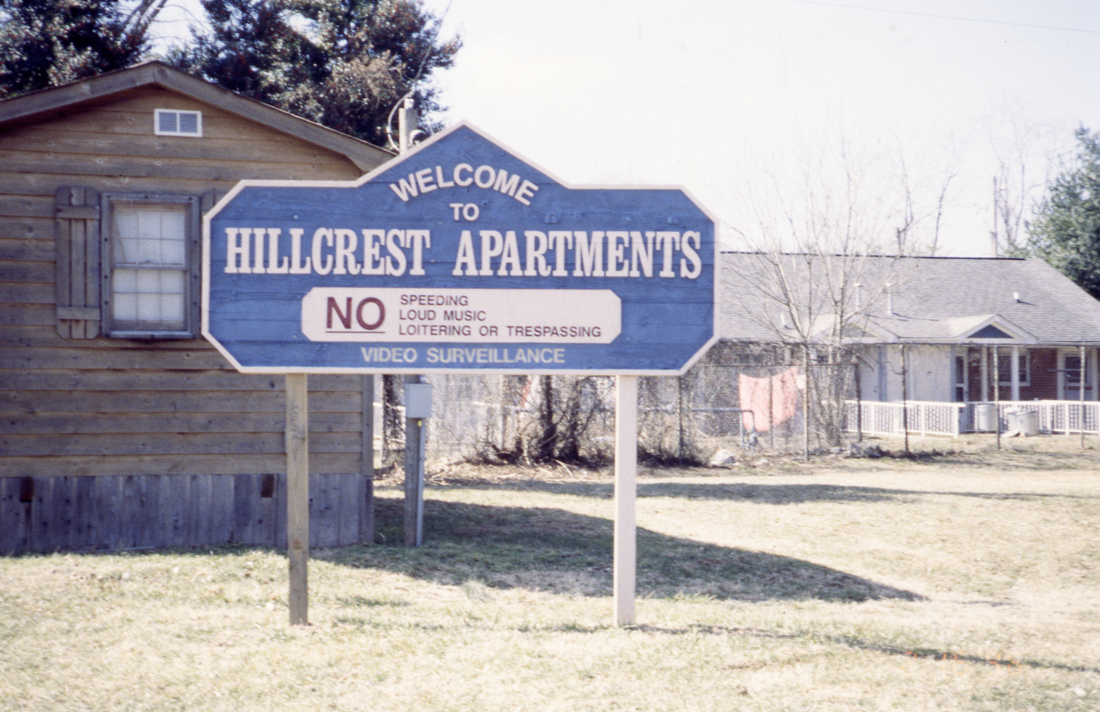Inadequate maintenance, broken appliances, improper pest control and issues with the Asheville Housing Authority’s executive director, Carl Vaughn, were among the list of grievances that led 32 tenants to go on a rent strike at Hillcrest Apartments in December 1967. At the time, the 234-unit complex was one of two public housing projects built specifically for African Americans; the third and final complex, Pisgah View Apartments, was designated for low-income white families.
Carl Johnson, president of the Hillcrest Tenants’ Association and a retired employee of the VA hospital, led the movement. “All you people going on this rent strike better save a dime or two so we can get some lawyers,” he asserted in a Dec. 5, 1967, article published in The Asheville Citizen. Along with improving living conditions, Johnson and fellow strikers demanded Vaughn step down from his position with the AHA.
In the following day’s paper, Vaughn responded. “We don’t anticipate any real difficulty with this thing,” the executive director said. “It’s happened in other places. Solutions have been worked out there and there’s no reason to think Asheville will be any different.”
Within 48 hours, the AHA hired 11 additional temporary maintenance workers to address tenants’ needs. But the gesture did not end the strike. “These men have been hired for three to six weeks,” Johnson told The Asheville Citizen on Dec. 9, 1967. “[W]e don’t regard this as any step toward getting what we are asking for,” he continued.
Vaughn’s removal and issues with lease agreements were among the matters that remained unresolved.
The Asheville Citizen soon derided the tenants for their ongoing protest. “Asheville is not the kind of community in which officials are likely to yield to organized pressure or the threat of pressure,” the paper wrote in a Dec. 12, 1967, editorial. “Members of the Tenants Association should give their ‘demonstration’ some sober second thoughts.”
But the group persisted. And they soon found allies — both Black and white — beyond the Hillcrest Apartments community. On Dec. 20, The Asheville Citizen reported that the Skylighters, an African American teenagers club, had filed a 150-signature notice to the city manager in support of the rent strike.
“We understand that 625 units of public housing will be built in our area in the next few years as part of the East Riverside Urban Renewal Project,” Larry Holloway, vice president of the Skylighters, told the paper. “We want it known that we will not live under conditions as people now do in public housing in Asheville.”
By Dec. 21, the AHA began repairing Hillcrest’s drainage issues. Robert M. Felkel, the organization’s vice chairman, told The Asheville Citizen the problem was a “legitimate complaint … that has probably existed since the housing was constructed.” Other repairs, including broken windowpanes, loose doorknobs and missing screens, were also being addressed.
Still, the strike continued into the new year. And by late January, after a handful of tenants from Lee-Walker Heights (Asheville’s first public housing project) joined in the movement, both Vaughn and Felkel announced their resignations.
In a wild twist, residents at the all-white Pisgah View Apartments responded to Vaughn’s resignation by threatening their own rent strike unless he was reinstated. Ultimately, 43 tenants withheld their February rent. Vaughn, however, remained committed to his decision to leave the organization.
By mid-February, the AHA warned that all noncompliant tenants at all three public housing units would face eviction proceedings if they did not pay their rent by Feb. 29.
“In the sense that they have focused attention on their plight, the strikers have ‘won,’” The Asheville Citizen conceded in a Feb. 16, 1968 editorial. “Now, however, they must pay up or find another home.”
On Feb. 27, W. Jennings Groome was named the new executive director of the AHA. Despite the organization’s earlier threat, there is no indication that eviction notices were served on Feb. 29 to noncompliant tenants at Lee-Walker Heights and Hillcrest. (Those on strike at Pisgah View Apartments had since relented.)
Shortly after Groome’s arrival, the strike ended, when on March 7, the AHA put in writing the list of improvements it intended to make.
Five months later, on Aug. 4, the Sunday edition of the Asheville Citizen-Times reported that conditions had improved at all three public housing units. Johnson, the Hillcrest Tenants’ Association president, praised Groome’s leadership. “As far as I am concerned, the executive director is doing everything in his power to satisfy complaints that were raised during the rent strike,” he told the paper.
As a result of these improvements, the paper added, “[Johnson] said the climate at Hillcrest is better.”
Correction: Article was updated on Oct. 12, to correct the spelling of W. Jennings Groome.



Perpetually, Asheville’s BIGGEST problem…. WAY TOO MUCH unmanaged public housing for a NC city this size. How did it happen?
Hello Thomas,
I believe the correct name is W. Jennings Groome. (He lived down the street from me on Country Club Road. ) His son Pete was a year behind me and your Uncle in school and his daughter Sarah was a year ahead of your dad. Son George was a year behind your dad.
Thanks Mike! I hope you’re doing well.
Not bad for age ’74.. Dodged the disease so far but I missed getting together with John this summer :-( I enjoy your historical articles… (but the fact that I lived an increasing number of them makes me feel a bit ancient ;-) Mike